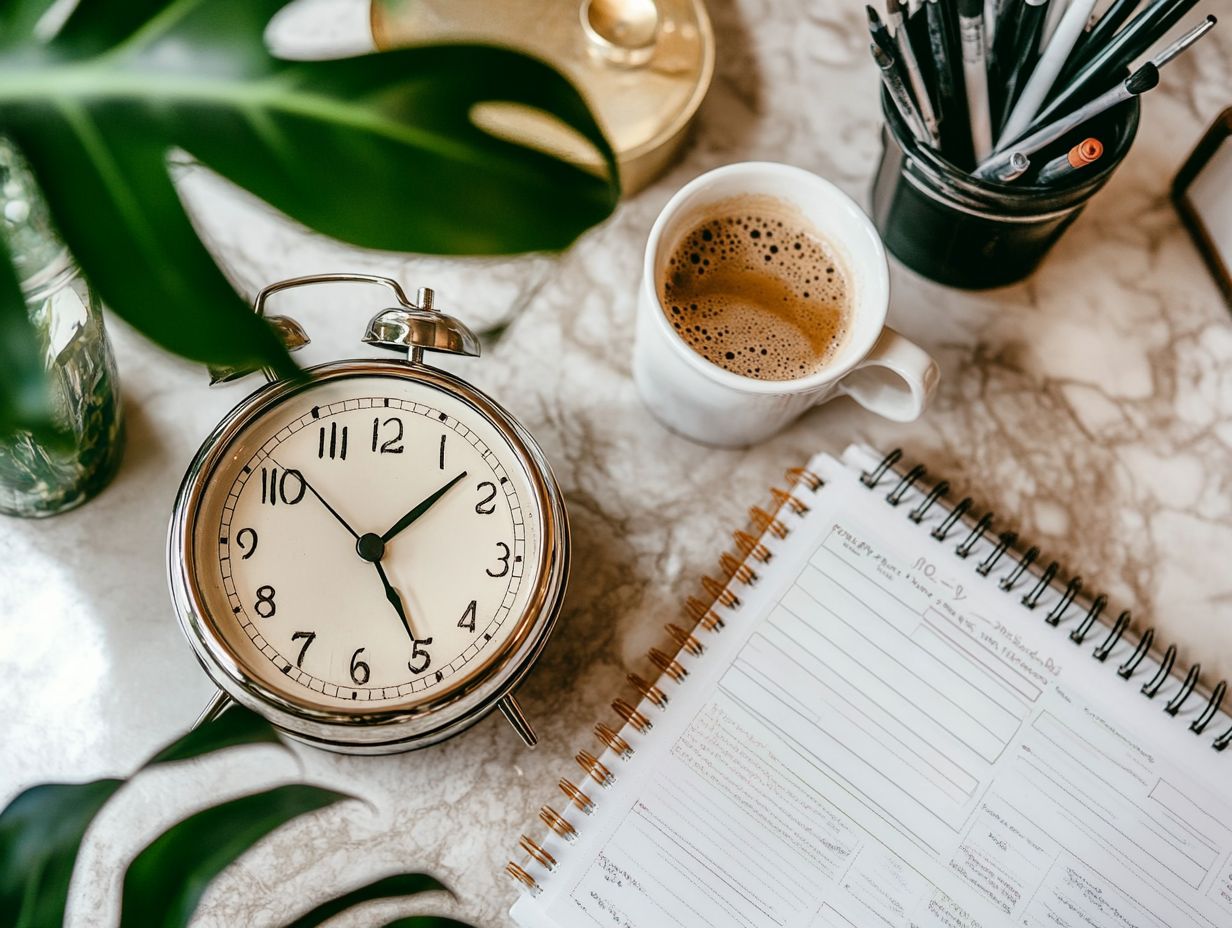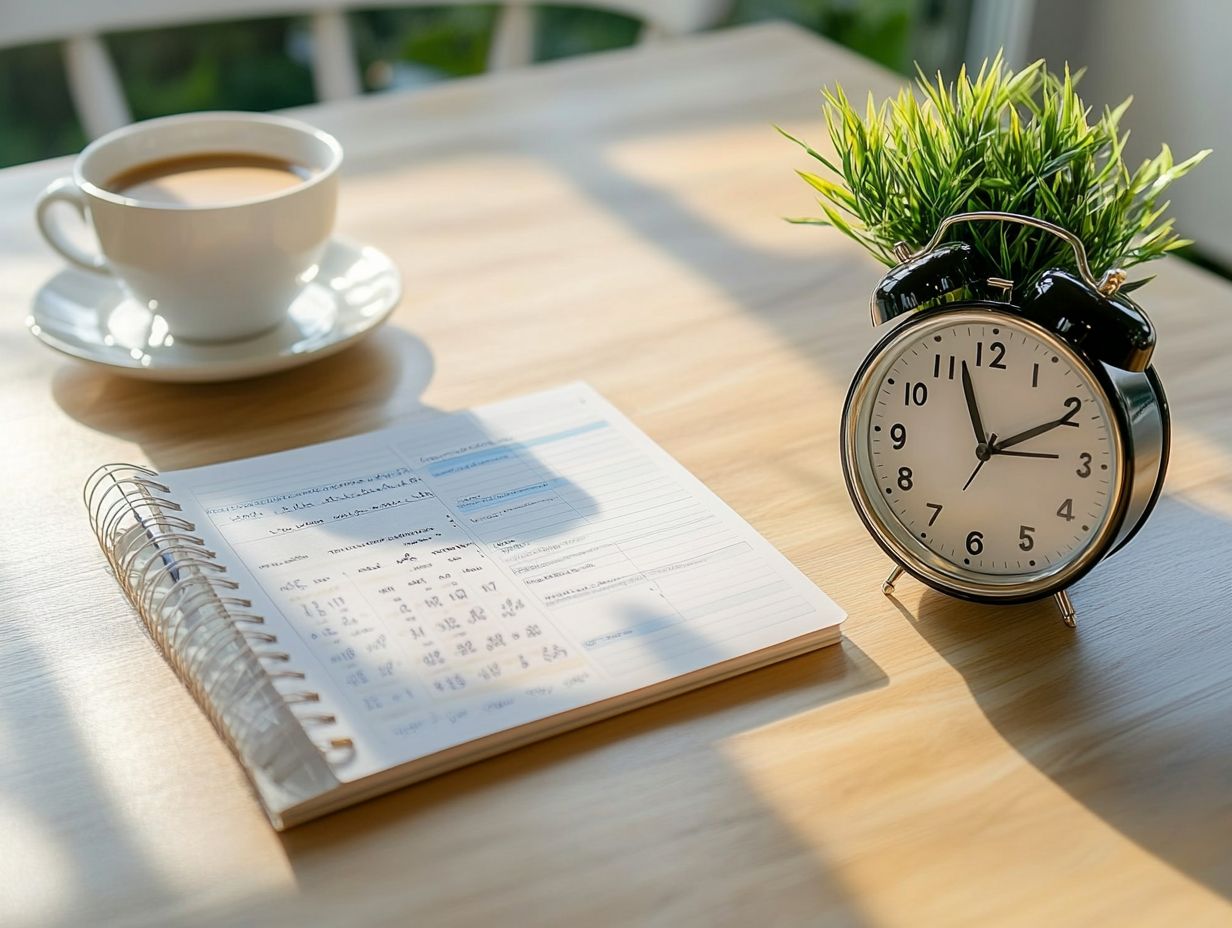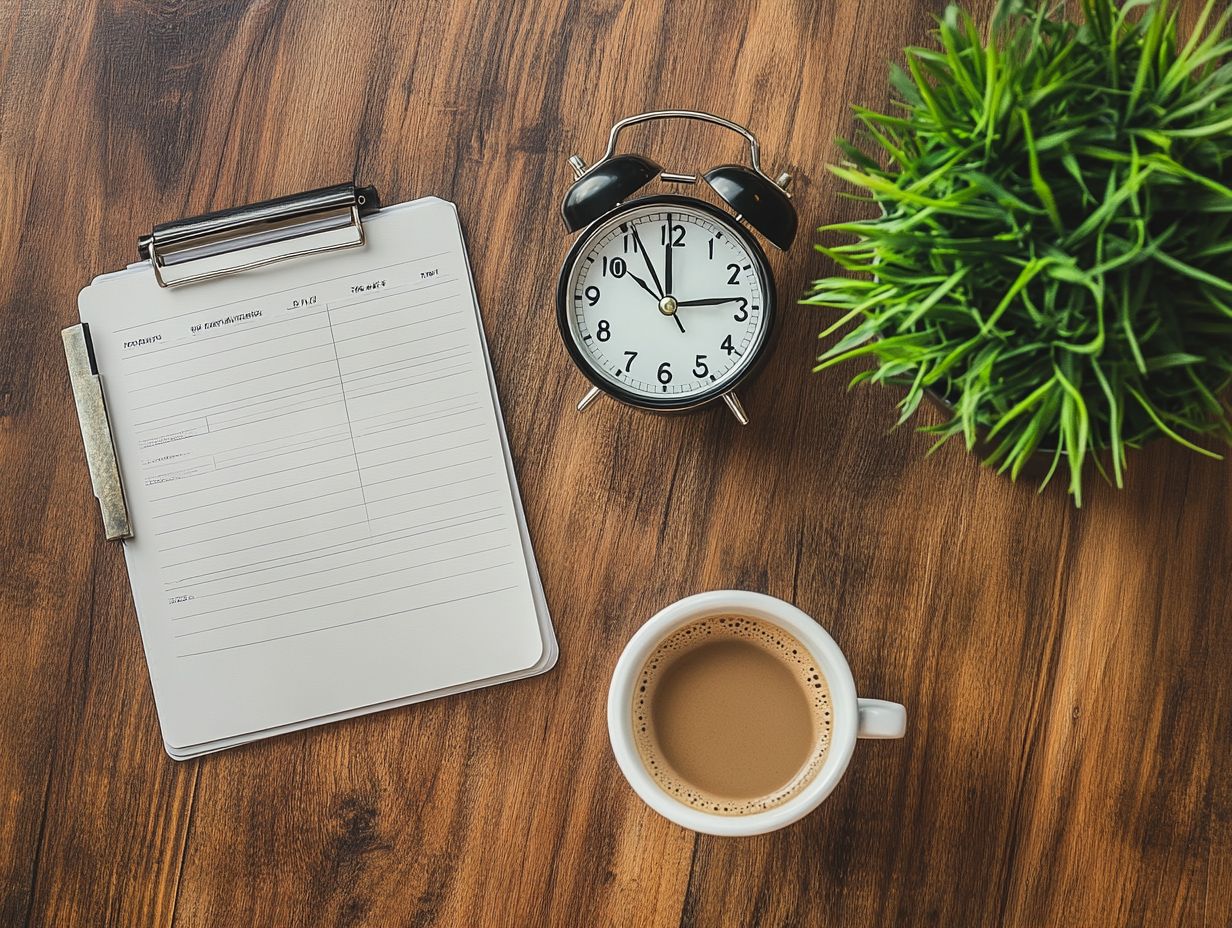The Importance of Routine in Stopping Procrastination
Procrastination is a familiar challenge that many individuals encounter. It often impedes productivity and elevates stress levels.
Recognizing and understanding procrastination is the crucial first step toward conquering it. This article delves into how establishing a consistent routine can serve as a powerful antidote to procrastination.
It outlines practical strategies for crafting a productive routine, highlights the benefits of adherence, and illustrates how consistency can revolutionize your time management approach.
Get ready to take back your time and boost your productivity!
Contents
- Key Takeaways:
- Understanding Procrastination
- The Role of Routine in Breaking Procrastination
- Creating a Productive Routine
- Tips for Establishing a Successful Routine
- Benefits of a Consistent Routine
- Combating Procrastination with a Routine
- Frequently Asked Questions
- What is the connection between routine and procrastination?
- How can having a routine help in stopping procrastination?
- Can a lack of routine contribute to procrastination?
- What are some key elements of a successful routine for stopping procrastination?
- How can incorporating routine into daily life improve productivity?
- Is it possible to break the cycle of procrastination through establishing a routine?
Key Takeaways:

- Understand procrastination by recognizing its signs.
- Use a routine to overcome procrastination.
- Create a productive routine with expert tips.
Understanding Procrastination
Understanding procrastination is crucial as you strive to achieve peak productivity. It often arises from a tug-of-war between your Present Self and Future Self. Your Present Self is drawn to immediate rewards through avoidance, while your Future Self longs for the long-term benefits that come from taking decisive action.
This phenomenon, known as Akrasia the tendency to act against your better judgment reveals a significant thought pattern that many individuals encounter. This illustration explains why procrastination can become a persistent challenge in your daily life.
Defining and Recognizing Procrastination
Procrastination is the act of delaying or postponing tasks. It is often fueled by thought patterns like self-doubt and anxiety that hinder effective task management.
This tendency can manifest as an aversion to engaging with responsibilities, creating a repeating pattern of guilt and inaction. You might find yourself sidetracked by trivial pursuits, constantly justifying your avoidance. This only intensifies feelings of inadequacy and overwhelm.
Typically, procrastination kicks in with tasks that appear daunting or uninteresting. The anticipation of discomfort prompts you to steer clear of them. Psychological factors, such as a fear of failure or perfectionism, often exacerbate this inclination, erecting barriers to productivity and reinforcing negative self-perceptions.
The Role of Routine in Breaking Procrastination
Establishing a daily routine is essential for breaking the procrastination habit. By creating a structured environment, you foster a sense of commitment and enhance your self-regulation, as highlighted in the power of routine in combating procrastination.
This approach allows for better task management and improved motivation strategies, giving you the power to tackle your goals with greater efficiency and focus.
How Routine Can Help Overcome Procrastination
A well-structured daily routine is your secret weapon against procrastination. It leverages practical strategies that enhance your time management, focus, and overall productivity.
Incorporating techniques like the Pomodoro Technique allows you to break your work into manageable intervals. This helps you maintain high levels of concentration while taking regular breaks to refresh your mind. Prioritizing tasks using methods such as the Eisenhower Matrix enables you to distinguish between what is urgent and what is important. This not only streamlines your task execution but also cultivates a delightful sense of accomplishment as you tick off completed items.
Creating a dedicated workspace free from distractions further solidifies your ability to stay focused. This ultimately results in a remarkable boost in productivity throughout your day.
Creating a Productive Routine

Creating a productive routine requires you to implement visual cues while breaking down larger tasks into smaller, more manageable steps. This approach not only promotes task achievement but also aligns seamlessly with effective motivation strategies.
Don t wait any longer! Start building your routine today and watch how your productivity soars!
Tips for Establishing a Successful Routine
Establishing a successful routine depends on using commitment tools that spark urgency and boost motivation. This makes it easier for you to stick to daily habits and overcome procrastination.
To implement these strategies effectively, start by setting clear and achievable goals that align with your long-term dreams. Doing this sharpens your focus. Adding deadlines creates urgency, pushing you to prioritize your tasks.
Getting support from friends or sharing your plans can solidify your commitment further. Small rewards can enhance your adherence to new habits; recognizing your progress keeps motivation alive.
By integrating these tactics into your daily life, you can create a sustainable routine that boosts productivity and aligns with your values and desires.
Benefits of a Consistent Routine
A consistent routine offers numerous benefits. It improves your time management and efficiency, making your daily activities smoother.
It also significantly reduces stress and anxiety, contributing positively to your mental health.
Improved Time Management and Efficiency
With a consistent routine, you naturally improve your time management and efficiency. This lets you prioritize tasks better and discover the importance of self-care in reducing procrastination.
By creating a daily structure, you designate specific time slots for tasks, ensuring that crucial activities get the attention they deserve.
This organized approach eliminates mental clutter from constant decision-making. It helps you break down larger projects into manageable steps, significantly reducing procrastination.
Using techniques like the Pomodoro Technique can be particularly helpful. It encourages focused work sessions followed by refreshing breaks that clear your mind.
As you complete each task, you build momentum, reinforcing a sense of accomplishment that boosts productivity and improves your overall time use.
Reduced Stress and Anxiety
Having a consistent routine can greatly lower your stress and anxiety levels. It promotes emotional balance and enhances your overall mental well-being by using effective techniques to manage procrastination.
By creating a daily schedule, you introduce a sense of predictability into your life, which is comforting. This predictability aids emotional regulation by reducing unexpected stressors that can disrupt your mental balance.
Sticking to a routine helps you manage your tasks more effectively, making you feel less overwhelmed. When you prioritize responsibilities, you’re less likely to postpone them, which usually triggers anxiety.
Ultimately, a structured daily pattern boosts productivity and nurtures a more balanced emotional state, enhancing your overall well-being.
Combating Procrastination with a Routine

Effectively combating procrastination requires practical strategies that leverage the power of routine. By establishing consistency, you empower yourself to strengthen self-control and adopt effective motivation techniques that truly make a difference.
Start establishing your routine today for immediate benefits!
Practical Strategies for Sticking to a Routine
Implementing practical strategies, such as utilizing a commitment device and maintaining focus, can greatly enhance your ability to stick to a routine and improve task management.
Start by establishing clear personal goals. These can act as a powerful commitment device, holding you accountable to your objectives.
Using tools like planners or digital apps streamlines your task management. This approach allows you to break down larger projects into manageable chunks.
Utilizing time-blocking techniques can create dedicated focus periods, minimizing distractions and fostering deeper concentration. Regular check-ins on your progress further reinforce your commitment, enabling you to make necessary adjustments and resulting in a more structured approach to your daily tasks.
By integrating these methods into your everyday life, maintaining a productive routine becomes not just achievable but also sustainable.
The Importance of Consistency in Overcoming Procrastination
The importance of consistency in overcoming procrastination cannot be overstated; it lays the groundwork for motivation and reinforces daily habits that resonate with the study of how people make decisions. Additionally, the importance of self-care in combating procrastination plays a crucial role in this process.
When you commit to a regular schedule, you start to weave these habits into your routine, making yourself less vulnerable to distractions and the temptation to procrastinate. The study of how people make decisions teaches us that immediate rewards often overshadow long-term benefits. By maintaining consistency, you can counteract this tendency.
A structured approach enhances your self-discipline and cultivates a sense of accomplishment, which, in turn, fuels your motivation. The connection between building habits and taking consistent action creates an environment where progress feels tangible, unlocking your potential for greater productivity and focus in all your endeavors.
Frequently Asked Questions
What is the connection between routine and procrastination?
Routine is essential in stopping procrastination because it helps to establish a consistent and structured approach to completing tasks, as highlighted in the role of routine in fighting procrastination, rather than constantly putting them off.
How can having a routine help in stopping procrastination?

Having a routine helps to create a sense of discipline and responsibility, making it easier to stay focused and motivated to complete tasks.
Can a lack of routine contribute to procrastination?
Absolutely. Without a routine, it can be easy to fall into a pattern of constantly delaying or avoiding tasks, leading to a cycle of procrastination. Understanding the power of consistency in beating procrastination can help break this cycle.
What are some key elements of a successful routine for stopping procrastination?
A successful routine thrives on regular breaks and prioritizing tasks to help stay on track and motivated.
How can incorporating routine into daily life improve productivity?
By having a routine, individuals can better manage their time and tasks, leading to increased productivity and a sense of accomplishment.
Is it possible to break the cycle of procrastination through establishing a routine?
Yes, establishing a routine can help break the cycle of procrastination by promoting accountability, consistency, and productivity in completing tasks, emphasizing the importance of self-discipline in overcoming procrastination.






